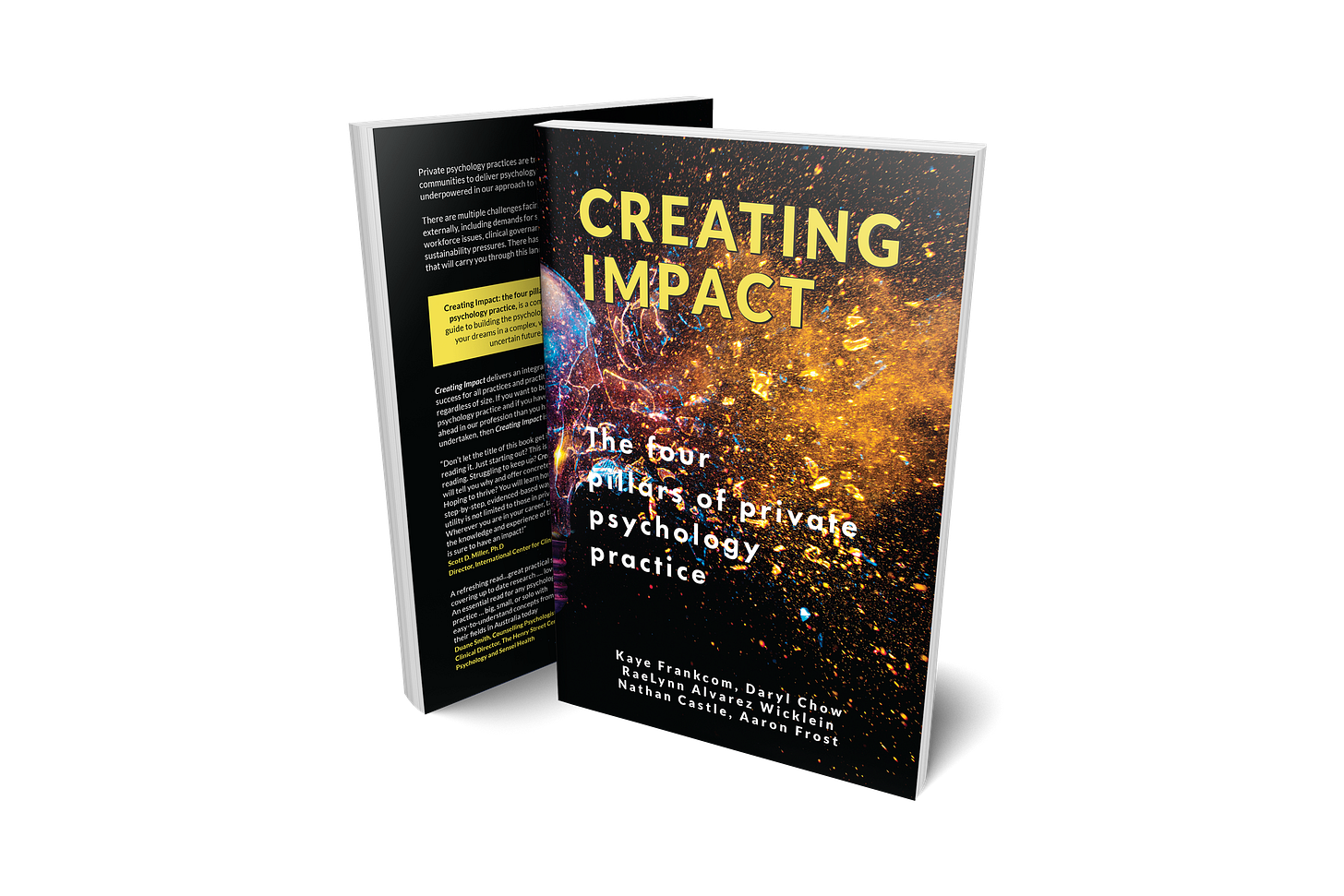Frontiers Friday 119: What I'm Reading and Why ⭕️
Relevant readings, why they matter to your clinical practice, and what great opportunities really look like.
It’s festive season, but I’ve kept my clinical practice open during this period, so I’m writing this at the end of the work-week (please pardon any typos). Not sure if it was the best idea, but I ran with my previous assumptions that some people have a tough time during this time of the year.
For you practitioners around the world help others, here’s my hopes for you during this season:
Finding life in unexpected places, and
Moving in the direction you want to take, while also being moved by people, places and purposes around you.
This week, because it’s the last one of 2022, I’m side-tracking with an experimental format on What I’m Reading and Why.
Will be back on Part IV on the topic of Play next week. In case you missed it, here’s the previous 3 Parts on Play:
📚What I’m Reading
This book posits a unifying theory for mental health issues and why classifying mental disorders as “separate” conditions is potentially misleading.
Particularly interesting is the research Chris Palmer gleans from regarding the role of metabolism on mental health.
Don’t let the book title put you off. I’m equally excited about psychiatrist’s Chris Palmer’s theory, and at the same time a little skeptical.
Why I am reading this:
- Lifelong fascination between the interplay of physical and emotional health.
- I am thinking of a handful of clients who might benefit from this perspective and engaging in dietary and lifestyle changes- Links with Lisa Feldman-Barrett concept of Body Budget. I’ve talked about her work previously in FF95: Emotions (Part I), as well as the idea of energy management (vs. time management) from Jim Loher and Tony Schwartz.
The Master and His Emissary by Iain McGilchrist
At first blush, I came into this book really skeptical because of the noise from the right-brain left-brain pop psych type of stuff.
However, I was intrigued after listening to McGilchirst on a podcast interview on Metalearn.
I’m only 30% through this book—it is quite a tomb—but I did not expect the amount of notes and highlights I’m making.
Why I am reading this:
- Research material for a book.
- (potential spoiler) Personally, before I read this book, I thought “the master” in this divided brain matter was the left…
- For some specific clients who are hampered with procrastination. The way I’ve taken this is that too much left-hemispheric evaluation, judging goes on before they begin a project. Instead, especially at the tip of starting something, one should engage a more open gestalt, non-evaluative view. For instance, when writing for a piece of research paper, write as much as you can know based on priors before doing the research. Wanna write 3 good verses for a song? Write 10 bad ones.
- His research on the role of music and language. Utterly fascinating. For instance, he argues that music predates language, instead of vice versa, which challenges Steven Pinker’s notion that music is just “auditory cheesecake.” Further, McGilchrist teases apart the role of music in society, which echoed stuff I’ve learned from Daniel Levitt’s book, This is Your Brain on Music.Dopamine Nation by Anna Lembke
It just occurred to me the 3 current books are all written by psychiatrists.
The term “dopamine” seems to have been a common parlance in our everyday speech.
The stories Lembke tells from her clinical practice are astounding.
Also, I didn’t know that from a neurological perspective, pain and pleasure are co-located.
Why I am reading this:
- I’m seeing alot more clients whose dopamine systems are hijacked. I only began to realise this in greater depth when I persisted to ask about “How do you spend your time,” and persisted further even after they respond with “Nothing much.” Turns out that much of the “doing nothing” activities like surfing the web, playing games, watching porn, checking socials, have over-pumped our pleasure threshold.
- I’m also personally worried about this hyper-consumption habit for myself. As Tom O’Connor pointed out to me a quote from Simone Weil’s "Attention is the purest and rarest form of generosity." When we lose our attention, we lose our ability to give. The biggest danger is not just our attention being robbed, but there is a chance that our intentions are being warped at the same time.Article: The Truth About Trauma Bessel van der Kolk, Rachel Yehuda and George Bonanno
I just finished this long-form article last night. I don’t think I’m being hyperbolic, but it is one of the best pieces I’ve read about how the mainstreaming of trauma is changing our culture.
Alexandra Beiner (his former platform was called Rebel Wisdom) is on Substack as well. Do subscribe to his work if this interests you.
Why I read this:
- I’m conflicted with the use of the word trauma on a clinical as well as on a cultural level. I see its benefits, but I also see its overreach, which leads to an over “narrative centrality” (i.e., overly defining our lives based on trauma) while less emphasising on our robustness. Words do matter. After all, our instrument as therapists is language, and the music is conversation.
⏸ Words Worth Contemplating:
”Actual great opportunities do not have “Great Opportunities” in the subject line.” ~ Kevin Kelly
Question: Have you read any of the above books or article? What are your thoughts on these? Leave a comment below.
Reflection
Great opportunities require two prerequisites:
Openness to Experience + No Expectations.
In your next event or activity, think about how you can stay completely open to experience, AND remove any expectation of an outcome.
May you move and be moved.
Final Announcement
LAST DAY to join the 13th cohort of Reigniting Clinical Supervision (RCS).
Are you a clinical supervisor?
If so, the online course Reigniting Clinical Supervision (RCS) that has been going on for more than 4 years is about to begin it’s next cohort.
Start Date: 2nd of Jan 2023, Mon.
Registration Closes: 30th of Dec 2023, Fri. (TODAY)
RCS is specifically designed to help you raise the bar of in supervision, and become more effectual with therapists, so that your positive impact promotes therapist’s development, and ultimately impact their clients.
Special Discount Code:
If you are reading on the Frontiers list do use the following exclusive 12% discount promo code: FRONTIERSVIP.
And if you are residing in a country where your currency is at a significant disadvantage, please drop me an email. If you are interested, I wanna help.
I’ve addressed the issues of clinical supervision in various places. For example:
Clinical Supervision at the Crossroads (An interview on Psychotherapy.net)
Frontiers Friday #30, #31, and #32 on the research findings of clinical supervision.
BIG HUGS TO NEW PEOPLE WHO ARE AT THEIR FRONTIER!
If you've just joined us, I'm glad you can join us at the "bleeding edge." Feel free to check out the back catalogue of Frontiers of Psychotherapists Development (FPD). You might also want to go into specific topics in the FPD Archives like
And if you want to see past newsletters, the entire archive is now made available in substack.
In case you missed it, see the most recent missives
Devotion to the Craft (6 Parts)
Caring for People in Organisations (3 Parts)
Clinical Supervision (3 Parts)
Feedback Informed Treatment (4 Parts)
Unintended Consequences (2 Parts)
Deep Learner (4 Parts)
Going Further with Deep Learner and The Use of Obsidian (6 Parts)
See What You Hear, Hear What You See (4 Parts)
Trauma (3 Parts)
Deliberate Practice (5 Parts)
Empathy (6 Parts)
Therapist Effects (2 Parts)
Client Point of View (4 Parts)
Tech Tools for Therapists (4 Parts)
Emotions (6 Parts)
Sensitivity (3 Parts)
Alliance (6 Parts)
Existence (6 Parts)
My other blog site is called FullCircles: Reflections on Living
By the way, don't feel bad if you want to unsubscribe to this newsletter. This might not be for you. The last thing I want is to add to the anxious clutter of our inboxes.
Daryl Chow Ph.D. is the author of The First Kiss, co-author of Better Results, and The Write to Recovery, Creating Impact, and the forthcoming book The Field Guide to Better Results.
Note:
These newsletter are free, but many hours are spent handpicking the curated list that make it to Frontiers Friday, as well as writing the essays and recording the videos and podcasts. Amazon affiliate links, if any, are to help ease the costs. You can also support the sustenance of this work by picking up any of the books, dive deep into our courses, or gifting them to others.
Big thanks.
Please excuse any typos.





